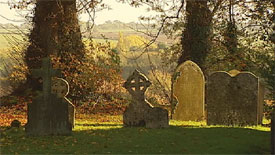The science behind the spooks
The science of the paranormal – how mainstream scientists are testing the claims of psychics and telepaths. Tom Clarke reports.

An Edwardian photograph allegedly showing a ghostly monk in the rectory grounds became the evidence that led to the first serious attempt to investigate a haunted house.
Harry Price was a writer who exposed fake mediums and saw himself as a serious investigator.
He went to Borley in 1937. Taking with him his cutting edge apparatus and 48 observers, they claimed to scientifically record all manner of psychic phenomena.
They even predicted the house would burn down. Which of course it did.
In Borley today, though the rectory has long gone – the rumours haven’t. And, to the continued annoyance of local residents, neither have the psychic investigators.
For 40 years Eddie Brazil has been following in the footsteps of Harry Price.
“Price at the time was, certainly in Britain, the most famous ghost hunter, ” explains Brazil.
“He used procedures and techniques for investigating haunted houses, séance rooms and mediums which paranormal researchers are still using today, even though they probably never heard of Harry Price”.
Harry Price achieved considerable notoriety for his “scientific investigations” into the alleged phenomena here in Borley village even though he never proved anything. Yet eighty years on fascinations with the paranormal is as great, if not greater, than it ever was. So is modern science any closer to explaining these mysterious phenomena?

Around fifty per cent of people claim some paranormal belief. Where there are questions, there are academics ready to answer them. Edinburgh University is one of a dozen respected institutions in the UK studying the paranormal.
Dr Caroline Watt, Parapsychologist at Edinburgh explained what her job is:
“Is there any genuine ability to communicate with another person by thought alone? Is there ability to predict future events or to influence the environment?
“These questions if solid evidence can be found for them would have implications for the world of physics and our understanding of how the world works.”
Dr Watt has examined all manner of paranormal activity: seeing ghosts, pre-cognition, mind reading, psychic healing – but so far, has found no persuasive evidence of any. The bulk of her research is into the mental underpinnings of supernatural belief.
“I believe in ghost experiences but I personally don’t believe in ghosts,” she said. “People believing that they can read each other minds and that they can have lucky beliefs – I think these give people a false but comforting sense of control over what is actually an unpredictable and uncontrollable world.”
Though science has yet to prove or totally disprove physical evidence of the supernatural – it can test psychic ability.
One of Britain’s most commercially successful psychics, Sally Morgan was last month accused of being fed information during show – something she strenuously denies.
Tomorrow prominent sceptics are challenging her to a test – correctly matching at least seven names to ten photographs of anonymous deceased people.
So far she has refused.
This truly sceptical inquiry – also called science – isn’t something Harry Price, or his successors ever strictly applied to places like Borley.
And if they had, it’s unlikely they could have disproved all the stories. Ghosts will linger here as long as some people want them to.